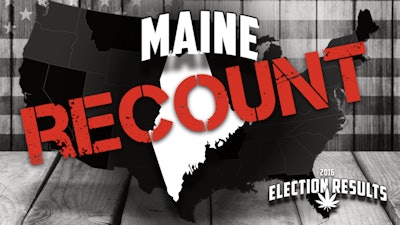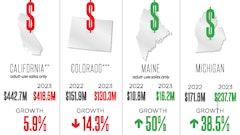
On Nov. 29, Maine Secretary of State Matthew Dunlap announced a recount on Question 1, which would legalize recreational cannabis for adults age 21 and over in the state, will take place on Monday Dec. 5 at Maine’s Department of Public Safety Building in Augusta, the state capital.
The No on 1 Campaign brought forward the recount request after official results showed a victory for Question 1 by just 4,073 votes.
“There is no evidence that a recount would change the result of Question 1,” said David Boyer, Campaign Manager for the Yes on 1 Campaign in a statement. “At the same time, $500,000 would be wasted on the process of recounting ballots. That’s half a million taxpayer dollars that should be spent on heating homes and funding schools.”
Kristen Muszynski, director of communications at the Department of the Secretary of State, says the $500,000 cost was a very rough estimate given by Secretary Dunlap and is “based mostly on the cost incurred to Maine State Police for collecting and transporting the ballots to the counting site … [and] includes the opportunity costs of having our Elections staff running a recount instead of doing their regular work.”
She adds that the State Police have estimated their costs at $70,000 per 100 towns (the recount will include all of the state’s 503 municipalities).
State law requires the State Police to collect the ballots for the recount and keep them in a secure State Police facility until the recount has been completed. The ballots are stored in tamperproof metal containers and are closed with specially numbered security seals and locks.
Starting at 9 a.m., representatives from both campaigns will begin hand recounting the ballots under the supervision of staff members from the Department of the Secretary of State. Recounting all the ballots from the state’s 503 municipalities could take up to six weeks, according to Muszynski. But the recount could end early if either party decided to call the race, she says.
“Recounts are conducted in phases, with an agreed-upon batch of cities/towns in each phase, since we cannot store and secure the ballots from every town/city in our centralized counting location,” she explains. “It will be up to the parties that requested the recount to decide when/if to call it off based on the results they are seeing, which means we likely will not be recounting all 503 towns.”


























